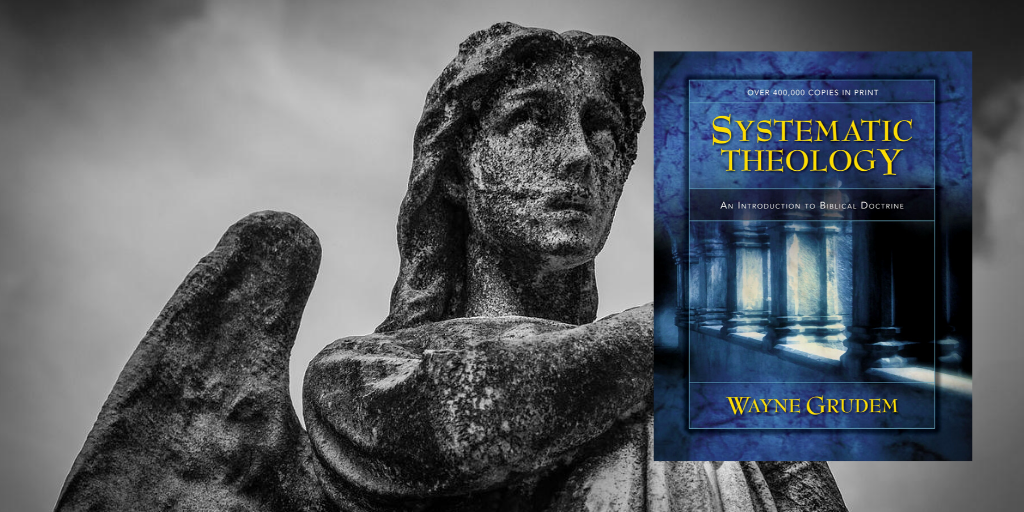Reading Systematic Theology with Wayne Grudem – Angels – What are angels? Why did God create them?
This post is part of a 50+ post series from the classic work by Wayne Grudem (PhD, Cambridge), Systematic Theology: An Introduction to Biblical Doctrine. The aim of each post is to provide an overview of each chapter in the book and related resources for each topic.
Synopsis of Chapter
In this chapter we learn that “angels are created, spiritual beings with moral judgment and high intelligence, but without physical bodies.” These beings are found throughout Scripture sometimes being named, with specific jobs, and include various attributes.
Angels fulfill particular purposes and plans. They serve God, being examples for us and our obedience. In addition, humans related to us, even if we don’t always see them. Though angels are unique among the creation, they are not God. We should never worship angels.
What Are Angels?
Angels are created, spiritual, and moral beings. They are like God in that they are spirits (Hebrews 1:14). But they are unlike God in that they are created like us. (Nehemiah 9:6). In addition, angels are moral since some fell from their lofty positions (2 Peter 2:4). Though angels are spiritual, they would sometimes take on bodily form to appear to people in Scripture (Matthew 28:5, Hebrews 13:2).
God speaks of angels as having “thrones”, ruling with “dominions” and being “rulers or authorities” (Colossians 1:16). Angels are not merely spiritual beings, or worse, Renaissance-era cherubs like Rafael once painted. Angels are powerful leaders in the heavenly realm.
The Bible describes angels in several ways. Though not all angels would match each of these terms, the angelic realm is revealed in this way in Scripture:
- “sons of God” (Job 1:6)
- “holy ones” (Psalm 89:5),
- “watchers” (Daniel 4:13)
- “powers” (Ephesians 1:21)
- “Cherubim” (Genesis 3:24)
- “Seraphim” (Isaiah 6:2-7)
- “living creatures” (Revelation 4:6-8)
- “mighty ones” (Psalm 103:20)
- Some are named like “Michael” (Jude 9)
A special angel known as the “angel of the LORD” seems to reveal himself to others as God himself. At various times in the Old Testament, the “angel of the LORD” found Hagar in the wilderness (Genesis 16:7), Abraham on Mount Moriah before sacrificing Isaac (Genesis 22:11), or in the flaming bush when Moses was called into ministry (Exodus 3:2). This angel is not the same kind of angel as other angels.
The Place of Angels
Angels occupy a certain place in the order of creation. For instance, angels are never said to have been made in the image of God like man and woman (Genesis 1:26-27). Angels don’t bear children like people (Genesis 5:3), but they serve people (Hebrews 1:14). Angels are intelligent, moral creatures since they are able to sin (2 Peter 2:4). They also currently sit above humans in God’s creative order (Hebrews 2:7), but one day Christians will judge angels (1 Corinthians 6:3). Angels are not the same as people.
Angels carry out God’s plans in ways we cannot do in the same way. They carry important messages to people (Luke 1:11-19, Acts 8:26). They execute judgments upon people like bringing a plague on Israel (2 Samuel 24:16-17) or killing Assyrian soldiers (2 Chronicles 32:21). In addition, they worship God in a special way as when the angels served God around his throne (Isaiah 6:2-3) or worshipped when Christ was born in Bethlehem (Luke 2:14).
Conclusion: Cautions About Angels
Angels are special beings. They would seem especially important if you actually encountered an angel as many have. But God warns people not to put too much confidence in angels. On several occasions, Scripture warns people about deceptive angelic beings. For instance, angels can carry a false gospel (Galatians 1:8) and Satan can disguise himself as an angel of light (2 Corinthians 11:14).
For this reason, we should be cautious about angels. We ought to respect angels as being messengers of God. Angels definitely serve God and minister to Christians (Hebrews 1:14). But we should be wary of interacting with fallen angels. Regardless of what sort of angel we may encounter, we should never worship angels (Revelation 19:10). Angels are not God, only created beings.
“Then I looked, and I heard around the throne and the living creatures and the elders the voice of many angels, numbering myriads of myriads and thousands of thousands, 12 saying with a loud voice, ‘Worthy is the Lamb who was slain, to receive power and wealth and wisdom and might and honor and glory and blessing!’” (Revelation 5:11-12)
Special Terms
- angel
- angel of the Lord
- archangel
- cherubim
- living creature
- Michael
- principalities and powers
- seraphim
- sons of God
- watchers
Resources: Wayne Grudem
- Wayne Grudem: Book: Systematic Theology: An Introduction to Biblical Doctrine
- Wayne Grudem: 148 Lectures on Systematic Theology at Scottsdale Bible Church
Related Resources
- OpenBible.info: Verses on Angels
- Phil Johnson: Angels: Messengers and Ministers of God
- Bible.org: Angelology: The Doctrine of Angels
- Wayne Grudem: Angels in the Bible: What Do We Actually Know About Them



